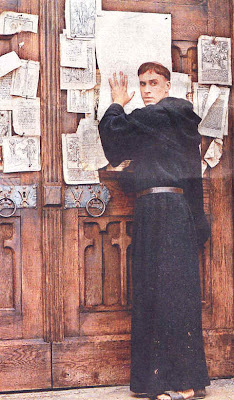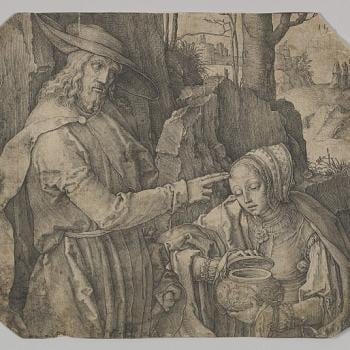 Today is the four hundred ninety first anniversary of that disgruntled Augustinian friar nailing his ninety-five theses to the the door of Wittenberg’s Castle Church. Those who like to nail down dates like to mark this as the dawn of the Protestant Reformation.
Today is the four hundred ninety first anniversary of that disgruntled Augustinian friar nailing his ninety-five theses to the the door of Wittenberg’s Castle Church. Those who like to nail down dates like to mark this as the dawn of the Protestant Reformation.
Having a monkey mind this immediately fired an old memory of a joke. I rummaged around the web to find a coherent version and stumbled upon this rather nice one.
A mild-mannered, beige-wearing pastor comes to the end of his days on Earth. Upon crossing over, he is much surprised to find himself, not at the big Potluck in the sky, but in Hell. After wandering around confusedly for a while, he bumps into Martin Luther.
“Brother Martin, what are you doing here?” asks our hero.
Martin replies, “I haven’t figured that out yet, but let’s see what we can learn.”
The two carry on together, and are shortly shocked to find themselves face to face with Saint Augustine. In response to their questions regarding his damnation, the saint grumpily replies, “Talk to Paul.”
Sure enough, there is Saint Paul, toiling away for eternity. “Paul,” asks the pastor, “How could you, of all people who have ever lived, be in Hell?”
“Well,” says Paul, clearly resigned to his fate, “Turns out it was works after all. Whaddya know?”
The blogger who gave us this version noted in an aside that her readers might not find this as funny as she, a child of the Lutheran heritage, did.
What it does is lay out the conundrum of Western religion, certainly Christianity, from its inception. How do we heal the broken heart? What “saves” us? From pretty much the beginning, again, at least of Christianity, here in the West people have fallen into two camps with their answers: grace and works.
From my perspective the question of the mechanism of atonement is a red herring. It has two problems, literalization and dualism. There is a literalist perspective that poisons all religions, near as I can tell. Within that literalization is an implicit dualism. If one doesn’t take one down the wrong path, the other does…
In my opinion within Christianity it is the literalization of the salvation story that wrecks it. The story of a world in ruin and how the creator sends his only son to become of the world, and through his suffering joins heaven and earth and overcomes hell, has a deep and compelling quality to it. Then they say not only does this describe our human heart but it actually happened in history. And the consequence of this is that if you simply accept the gift of the divine as literally true you will be delivered from hell and given heaven. And if you don’t, well its hell for you…
Well, no it didn’t. And no, it won’t, neither way…
However, that doesn’t mean it doesn’t have truth about it. Within the heart of the story we find our hearts, we can indeed reconcile the hurt and the healing, and find salavation for the whole blessed mess.
What we do counts, totally.
And grace informs everything, totally. (Yes, the more traditional formulation is “faith,” but I suggest “grace” more accurately captures the sense at the heart of the statement. Faith too easily too quickly becomes blind faith. Which is a problem, but not the primary problem. So the best word, I think: grace…)
Within the liberal tradition I like that the Universalists an the Unitarians each took a different door to that healing, to that saving, the Universalists grace and the Unitarians works; and somehow ended up in the same place.
The problem is a false dualism. It has to do with how we really are one and we really are multiple. Our Western philosophy which has served us so well in so many ways fails us here. As I mentioned in a recent sermon, and actually lifted from numerous others, reality is similar to energy. We see it now as a wave, now as a particle. Our dualistic perspectives have limited utility, and we need to hold them lightly…
What it takes for us to find our healing, best I can tell, is to surrender our knowing, whatever it is, and to confront it all with an open heart.
As the man said, only don’t know. From that point it all becomes clear.
We need to open the eyes we have, and listen with the ears we have. That’s all.
When that happens we can be informed by the best of the world’s faiths, not to mention science, and the arts, and nature itself. All of it begins to sing our hope, our salvation.
What was literalist and dualist, becomes poetic and unifying.
Then we discover each act is a healing act, and grace informs everything we do.
And in that moment old Martin and the gang discover hell becomes heaven.
One thing…












